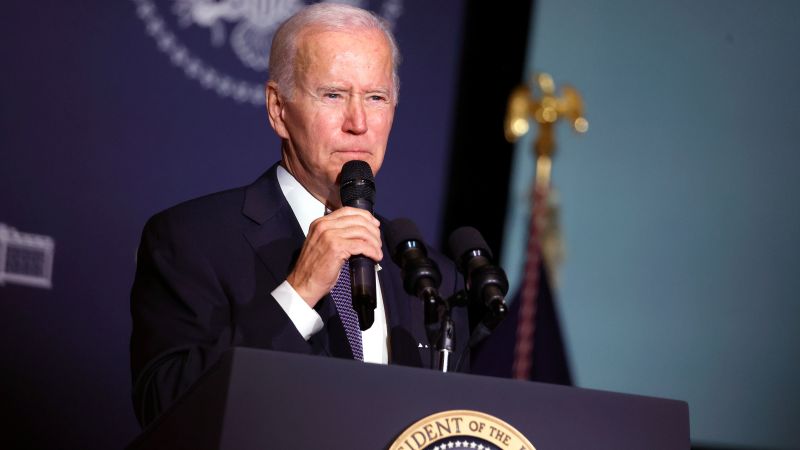

CNN
—
As the start of summer brought several landmark Supreme Court rulings that jerked the law to the right, across the street, the Democratic-controlled Senate was confirming judicial nominees whose progressive legal backgrounds served as a foil to the direction the conservative justices were heading.
Two weeks after the court handed down a ruling weakening federal protections for striking workers, the Senate put on a California federal court Casey Pitts, a labor lawyer who had helped fend off a legal challenge to a pro-union law in Seattle.
Natasha Merle, a civil rights attorney and former public defender who represented defendants bringing post-conviction challenges, was confirmed for Brooklyn’s federal court the day before the high court made it harder for certain kinds of those challenges to be pursued.
And close to the one-year anniversary of the Supreme Court’s ruling overturning a constitutional right to an abortion, the Senate approved for a Boston-based federal appeals court Julie Rikelman, the reproductive rights lawyer who argued before the justices in favor of preserving abortion rights.
The newly minted judges represent the culmination of promises by President Joe Biden and Democratic lawmakers to bring more diversity, including varied professional experiences to the bench.
“It has been the case in the past that for a lot of these positions there’s been over representation from large corporate firms – not that people from those firms can’t be great US Attorneys or judges,” Sen. Raphael Warnock told CNN. “But as somebody from the activist community, as someone who’s been focused all my career on civil and human rights, I find it heartening to have people who bring that perspective and some balance.”
While the timing of the Senate votes created a striking split screen with what was happening at the United States’ highest court, the recent confirmation spree was the product of years of work to expand the pipeline through which potential judicial nominees travel.
It also came after Senate Democrats and the White House faced setbacks with the absences of key lawmakers from the Capitol, and as Senate traditions towards nominations have put some constraints on where Biden can make his mark on the judiciary.
The stars only aligned for the string of confirmations after the return of Sen. Dianne Feinstein, who was away from Washington for March, April and some of May recovering from a case of the shingles. Her absence deprived Democrats of their tie-breaking vote to advance out of the Judiciary Committee nominees that lacked GOP support.
Republicans refused to back a bid to temporarily replace her on the panel and the logjam risked doing severe damage to Biden’s nominees.
But with her return, and with the ability of Democrats to secure the attendance they’d all need for votes on the floor, the pace picked up again in mid-May, and last week provides a sample of just the type of nominees Biden has recently seen confirmed.
On Wednesday, the Senate confirmed to a federal court in Washington state Tiffany Cartwright, whose legal background includes bringing wrongful deaths lawsuits against law enforcement for fatal shootings of Black people and a sexual harassment case brought by a corrections officer against a state prison.
Kymberly Evanson, who represented the ACLU of Washington in its challenge to the Trump travel ban aimed at Muslim countries, was also confirmed last week to a district court in Washington. The Senate additionally confirmed to a federal court in Massachusetts Myong Joun, a state court judge with previous experience in criminal defense and plaintiff-side employment law.
While judges are often identified by the party of the president that nominated them, progressive advocates say that these and other Biden picks demonstrate a contrast from previous Democratic White Houses. Starting with President Jimmy Carter, Democratic presidents have made strides in bringing more women and people of color to the bench. But often they would be of a similar professional mode, with former prosecutors and corporate lawyers dominating the nominee pool.
Chris Kang, chief counsel of the progressive legal group Demand Justice, recalled an early Obama judicial nominee whose confirmation languished for nearly two years amid opposition by Senate Republicans, who objected to the work the nominee, Edward Chen, did for the ACLU before serving eight years as a magistrate judge. In a floor speech at the time, then-Sen. Jeff Sessions – a Republican of Alabama who would go on to be Trump’s first attorney general – decried the “ACLU DNA” Chen and other Obama nominees had.
“Now fast forward and we’re confirming people directly from the ACLU to the bench,” said Kang, who worked on judicial nominees in the Obama White House.
One such appointee is Dale Ho, a newly-confirmed judge on Manhattan’s federal court who previously led the ACLU Voting Rights Project. The other is Nusrat Choudhury, confirmed last month to the federal court in Brooklyn. Her ACLU resume includes major roles in its racial justice program and its national security project. Choudhury is also the first Muslim woman to be confirmed as a federal judge.
That nominees with such prominent civil rights backgrounds ended up on the federal bench was the fruition of a concerted effort to expand the pipeline of who is considered for judgeships.
The professional diversity push was jump started by a letter that Biden’s incoming White House Counsel Dana Remus sent to Democrats highlighting a focus on nominating lawyers “historically underrepresented on the federal bench,” including “public defenders, civil rights and legal aid attorneys, and those who represent Americans in every walk of life.”
How senators go about finding possible nominees for the White House to consider has also changed, with some delegations creating or retooling the selection commissions they’re on to pool lawyers to recommend.
“We work very hard to make sure that the committee is diverse, which is then producing diverse candidates,” said Sen. Ed Markey, a Democrat of Massachusetts, who uses such a commission with fellow Massachusetts Democratic Sen. Elizabeth Warren. Georgia Sens. Jon Ossoff and Warnock set up a selection commission that included several civil rights attorneys and an immigration lawyer; it produced two district court nominees – both confirmed last year– with respective backgrounds in public interest law and as a public defender.
Another pivotal moment, progressive court advocates say, was the move by Biden early in his presidency to elevate Ketanji Brown Jackson, a former public defender then serving on DC’s federal trial court, to the DC Circuit – a known feeder court for the US Supreme Court. A year later, Biden made history with her Supreme Court nomination, as she was both the first Black woman and the first former public defender to become a justice.
“That helped solidify that this isn’t just a district court situation. This isn’t just a circuit court situation. That this really is supreme court priority as well,” said Lena Zwarensteyn, senior director of the fair courts program at The Leadership Conference on Civil and Human Rights.
The attacks Jackson received from the right during the Supreme Court nomination for her legal background – Sen. Tom Cotton, an Arkansas Republican, compared her public defender work representing Guantanamo Bay detainees to defending Nazis at Nuremberg – echoed Republican criticism of lower court nominees who had similar experience representing criminal defendants, including indigent ones.
Swipes by GOP senators at nominees who were public defenders or civil rights attorneys played into Republican messaging that the administration was soft on crime; Texas Sen. Ted Cruz has described the judicial push as part of a multi-pronged Biden plan to defund the police.
However, while some of the Biden judges that were confirmed in recent weeks were approved after only their nominations stalled out in last Congress’ 50-50 Senate, the GOP “tough on crime” talking points aimed at their legal backgrounds had not led to any mass Democratic defections. (The one nominee – Michael Delaney – whose confirmation publicly collapsed in the face of Democratic skepticism withdrew himself after scrutiny of his representation of an elite boarding school in a sexual assault case.)
Because Senate Democrats are continuing to observe a tradition known as blue slips for district court judges, Biden faces constraints that limits where he can most dramatically reshape the federal bench.
Under the blue slip tradition, district court nominees only advance if they have the support of both of their home state senators – represented by physical blue slips of paper. The most prominent examples of Biden judges with civil rights backgrounds are on district courts in blue states. Pitts, the labor lawyer who helped Seattle defend its pro-union law, was confirmed last month to the federal bench in California, as was Hernan Vera, a former state court judge who as a lawyer worked on immigrants’ rights issues.
Merle, the former public defender and NAACP-LDF civil rights lawyer whom the Senate approved recently, was one of several nominees with civil rights backgrounds touted by Senate Majority Leader Chuck Schumer, whose recommendations for the New York federal bench helped set the tone for the rest of the Senate.
Biden has had some success in finding district court nominees for purple or red states that have the support of Republican home state senators, but often those appointees come from a more conventional legal background. But there’s only so much traction Biden can make in countering the impact of former President Donald Trump’s judicial overhaul, and some on the left have called on Democrats to abandon blue slips for district court nominees.
“I think the biggest challenge we’re having now is where we’re sort of veering off into two sets of justice that’s determined, you know, not just by the President, but by your senator,” Kang said.
Still, that doesn’t take away the impact Biden’s focus on professional and demographic diversity will have in states where those nominees have been confirmed, advocates say. And because Republicans under Trump abolished blue slips for circuit court nominees, the Senate Democrats have been able to move forward recently with two notable Biden nominees to appeals courts that lean right. One of them is Rachel Bloomekatz, a public interest attorney who has experience in environmental law, and who also represented students who challenged an Ohio voter registration restriction as well as the family of an unarmed teenage migrant who was fatally shot by a Border patrol agent. The Senate is scheduled to vote Tuesday on her confirmation to the 6th US Circuit Court of Appeals, where Trump had a heavy influence.
The confirmation of Nancy Abdu to the 11th US Circuit Court of Appeals, which covers the southeast and was drastically reshaped by Trump, made her the first Black woman confirmed to that appeals court. When Abudu, an alum of the ACLU and Southern Poverty Law Center who litigated key voting rights cases, secured Senate approval in mid-May, it was seen as the “tip of the spear” of the current wave, Zwarensteyn said.
“It’s not just the question of the jurisdiction for a district court judge or the states that the circuit covers for a circuit court judge,” said Rebecca Buckwalter-Poza, a counsel for the left-leaning court advocacy group Counsel at the Alliance for Justice. “But it’s the law that they’re making and how other courts may be influenced by it.”
